To master post-interview emails, start with a heartfelt thank-you note to express gratitude and reinforce your interest in the position. Send this within 24 hours to show enthusiasm and professionalism. Depending on your interview dynamics, consider a follow-up email after two weeks to inquire about your application status. Keep your messages concise and tailor them to the specific conversation topics. Networking with contacts after the interview can also enhance your visibility and opportunities. By focusing on personalization and timing, you'll strengthen your candidacy and leave a positive impression. There's much more to explore on this topic.
Key Takeaways
- Send a thank-you email within 24 hours to express gratitude and reinforce your interest in the position.
- Personalize your message by referencing specific topics discussed during the interview to demonstrate engagement.
- Follow up approximately two weeks later if you haven't received a response, keeping the tone positive and professional.
- Maintain networking relationships by reaching out to contacts for insights and referrals related to your job search.
- Use concise subject lines like "Checking in RE: [Job Title]" to make your follow-up emails clear and focused.
Importance of Follow-Up Emails

In today's competitive job market, sending follow-up emails after an interview can make a significant difference in your candidacy.
These emails not only express gratitude for the opportunity but also reinforce your interest in the position. By following up, you demonstrate professionalism and proactive communication skills, which employers value.
A well-crafted email can keep you top of mind, especially when hiring managers are making decisions. Additionally, it allows you to reiterate your qualifications and highlight key points from the interview that align with the company's needs.
Remember, timing matters; sending your follow-up within 24 hours shows your enthusiasm and respect for the interviewer's time.
Types of Post-Interview Emails
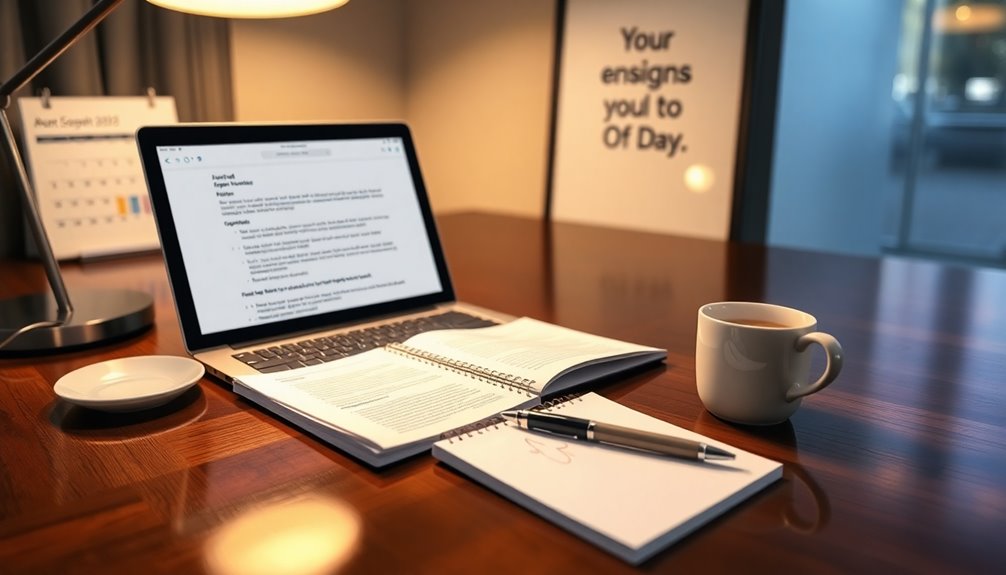
Sending a follow-up email after an interview is just the first step; understanding the different types of post-interview emails can further enhance your communication strategy.
The immediate thank-you email is essential, expressing gratitude and reiterating your interest in the role right after the interview.
If you haven't heard back after two weeks, a follow-up email inquiring about the status of your application shows your continued interest.
Finally, consider a networking email for maintaining professional relationships, even if you don't land the job. This type of email helps keep doors open for future opportunities.
Each type requires careful timing and context, so tailor your messages based on your interactions and the company culture.
Crafting the Perfect Thank-You Note
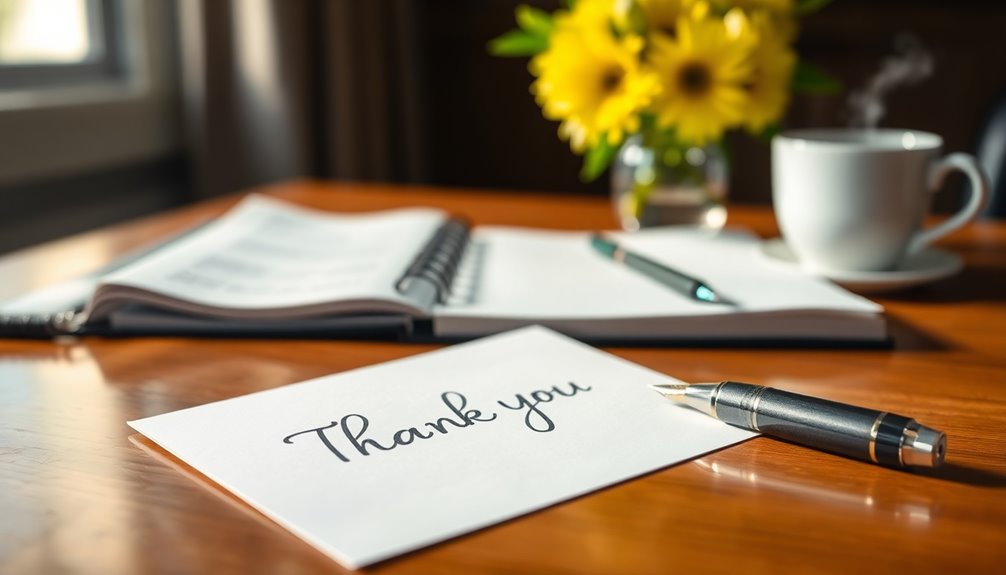
Crafting the perfect thank-you note is essential after an interview, as it often leaves a lasting impression on your potential employer. Start by expressing genuine gratitude for the opportunity and the time the interviewer spent with you.
Mention specific aspects of the conversation that resonated with you, showcasing your passion for the role. Briefly highlight relevant skills or experiences that align with what you discussed, reinforcing your fit for the position.
Keep it concise—one or two paragraphs is ideal. Don't forget to close with an invitation for further communication, expressing your enthusiasm to contribute to the team.
Finally, proofread for typos and clarity before sending it within 24 hours to guarantee it remains fresh in their minds.
Following Up Without a Response
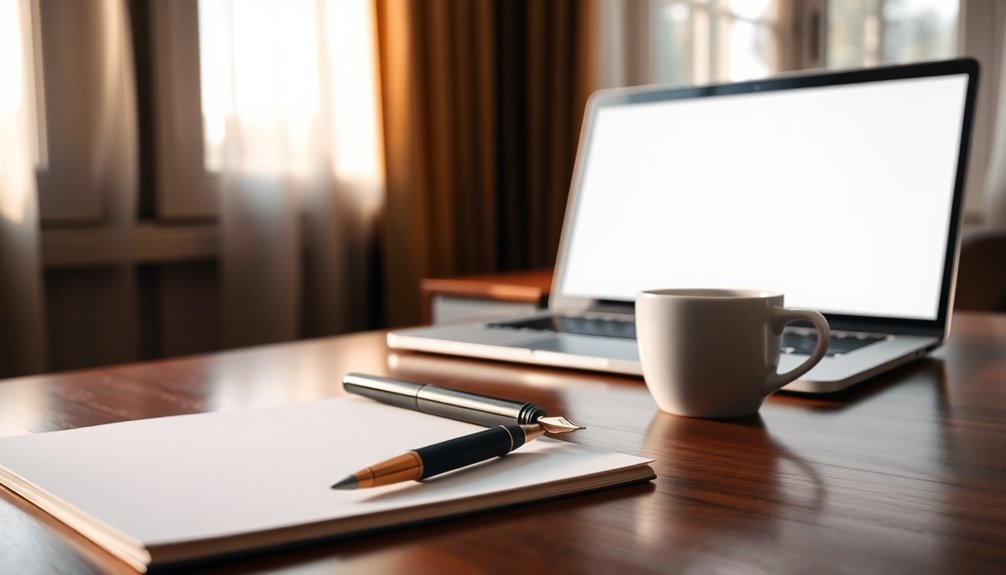
Following up after an interview can feel intimidating, especially when you haven't heard back.
It's important to maintain your enthusiasm without appearing desperate. Wait about two weeks after your initial thank-you email before reaching out again.
Keep your follow-up brief and to the point. Reiterate your interest in the role and mention any specific topics from the interview that excited you. A simple subject line like "Checking in RE: [Job Title]" works well.
Don't forget to offer your assistance if they need more information to make their decision.
Networking After the Interview
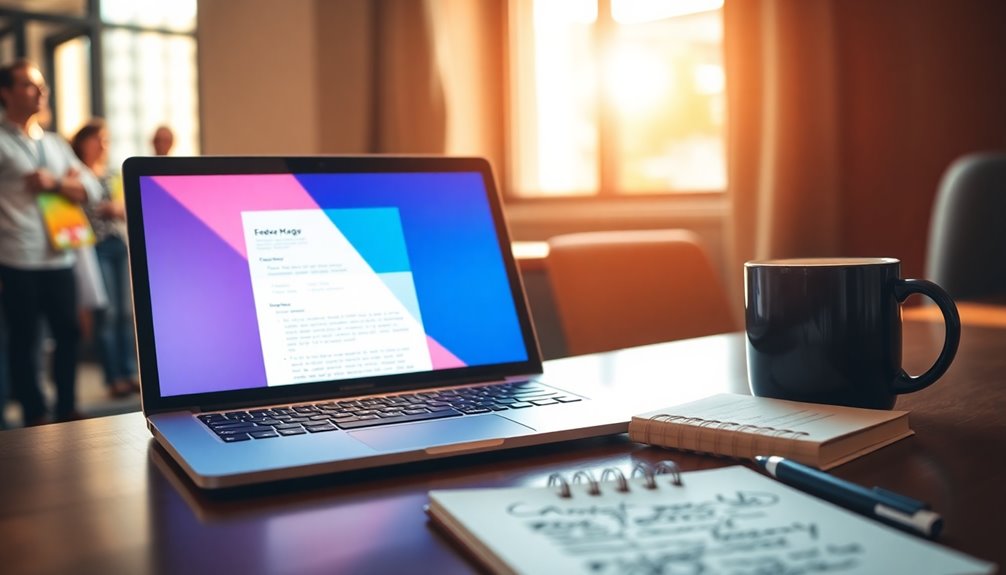
After you've sent your follow-up email and are waiting for a response, it's a great opportunity to focus on networking, which can play a significant role in your job search.
Reach out to former colleagues, industry contacts, or alumni who might provide insights or referrals related to your desired position. Share your recent interview experience and express enthusiasm for the role. This keeps you top-of-mind and could lead to unexpected opportunities. Building meaningful connections through networking can significantly enhance your chances of finding the right job. Additionally, consider exploring remote AI job opportunities as they continue to rise, which may lead to valuable contacts and insights. Engaging with professionals in online reputation management can also provide you with unique perspectives on enhancing your personal brand in the job market.
Furthermore, engage with relevant content on platforms like LinkedIn—commenting on posts or joining discussions can help you stay visible. Implementing data-driven marketing strategies can also enhance your networking efforts and make a more impactful impression.
Timing Your Follow-Up
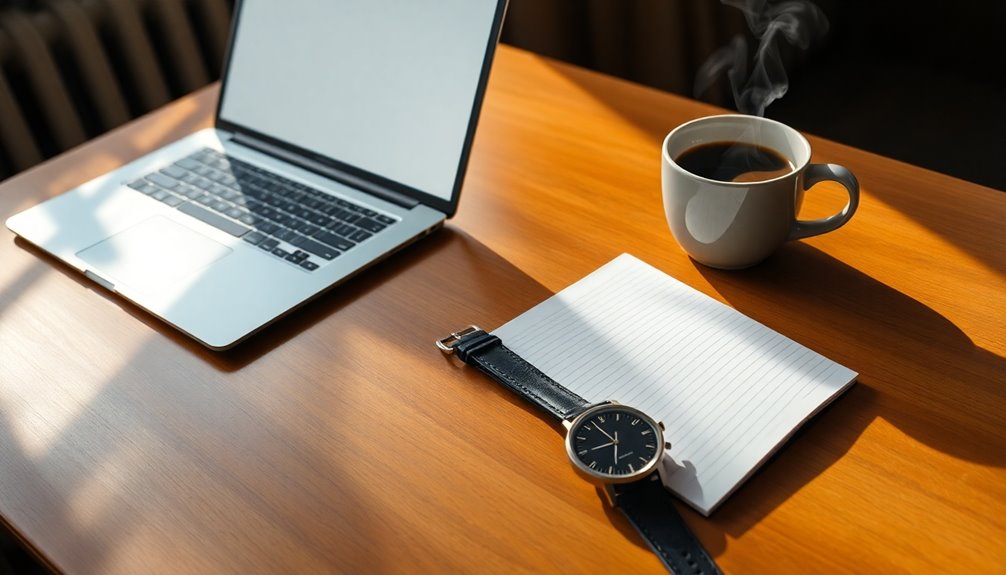
The timing of your follow-up email can greatly impact the impression you leave on your interviewer. Aim to send your immediate thank-you email within 24 hours of the interview. This indicates enthusiasm and reinforces your interest in the position.
If you haven't heard back after two weeks, it's appropriate to send a follow-up email inquiring about your application status. This illustrates your continued interest and keeps you on their radar.
However, avoid sending multiple emails in quick succession; patience is key. Remember, timing reflects your professionalism and respect for their hiring process, so choose your moments wisely to enhance your candidacy without appearing overly enthusiastic or intrusive.
Personalizing Your Communication

Personalizing your communication can greatly enhance your follow-up emails and make a lasting impression on your interviewer. Tailor your message by referencing specific topics discussed during the interview, which shows you were engaged and attentive. Use the table below to help you identify key points to personalize your emails:
| Key Point | Example to Reference | Impact on Interviewer |
|---|---|---|
| Common Interests | Mention a shared hobby or interest | Builds rapport |
| Role Challenges | Discuss a challenge they highlighted | Demonstrates your problem-solving ability |
| Company Values | Reflect on their mission or values | Shows alignment with their culture |
| Personal Connection | Recall a personal anecdote shared | Creates a memorable connection |
| Future Vision | State how you envision contributing | Illustrates your commitment |
Make your follow-up memorable by weaving in these personalized elements. Additionally, remember that celebrating small wins can reinforce positive feelings about your interview experience and motivate you for future opportunities. Focusing on content relevance in your communication can also enhance your perceived value as a candidate. Furthermore, understanding the importance of niche selection in your communication can help you tailor your approach to better resonate with the interviewer’s expectations. Recognizing patterns of behavior in your interactions can also provide insights into how to adapt your communication style effectively. Remember to highlight specific examples of your accomplishments using the STAR technique for interviews to showcase your skills and experiences effectively. Incorporating these personalized elements and strategies into your follow-up can leave a lasting impression and demonstrate your dedication to the position. Utilizing these techniques can not only make your follow-up memorable but also increase your chances of standing out among other candidates.
Frequently Asked Questions
How Long Should a Follow-Up Email Be?
A follow-up email should be concise and to the point.
Ideally, keep it between 50 to 150 words. This length allows you to express gratitude, reaffirm your interest in the position, and mention any relevant skills without overwhelming the reader.
You want to maintain professionalism while being respectful of their time.
Make sure every word counts, focusing on what's essential to reinforce your candidacy.
Keep it clear and engaging!
Can I Follow up More Than Once?
Yes, you can follow up more than once, but do it wisely.
After your initial thank-you email, wait about two weeks before sending a follow-up.
If you still haven't heard back, it's okay to check in again after another week or two.
Each time, express your continued interest in the position and offer any new insights or information that might be relevant.
Just make sure you don't come across as overly persistent.
Should I Attach My Resume in Follow-Up Emails?
Research shows that 70% of interviewers appreciate follow-up emails, but attaching your resume can be a double-edged sword.
If you're applying for a new role or if there are changes in your qualifications, attaching an updated resume can be beneficial.
However, if you've just interviewed for a specific position, it might be unnecessary. Instead, focus on expressing gratitude and reinforcing your interest in the role to keep the communication effective.
What if I Forgot to Send a Thank-You Email?
If you forgot to send a thank-you email after your interview, don't stress too much.
Just send a brief email now, expressing your appreciation for the opportunity. Acknowledge your oversight and highlight your enthusiasm for the role.
It's never too late to show gratitude and reinforce your interest. Keep it concise and genuine, and you'll leave a positive impression, even if it's a bit delayed.
How Can I Make My Email Stand Out?
Imagine your email is a beacon in a sea of messages, shining brightly to catch attention.
To make your email stand out, personalize it. Reference specific moments from your conversation, and express genuine enthusiasm about the role.
Keep it concise, yet impactful. Use an engaging subject line that hints at your conversation.
Finally, add a touch of creativity—perhaps a relevant quote or unique insight that aligns with the company's values.
Conclusion
Think of your post-interview emails as seeds you plant in a garden. With a thoughtful thank-you note, you water the roots of your connection, nurturing potential growth. If you follow up without a response, you're gently tending to the soil, ensuring your efforts don't go unnoticed. As you network, you're cultivating a vibrant ecosystem of relationships. By timing your communication right and personalizing your messages, you'll watch your career blossoms flourish into fruitful opportunities.









